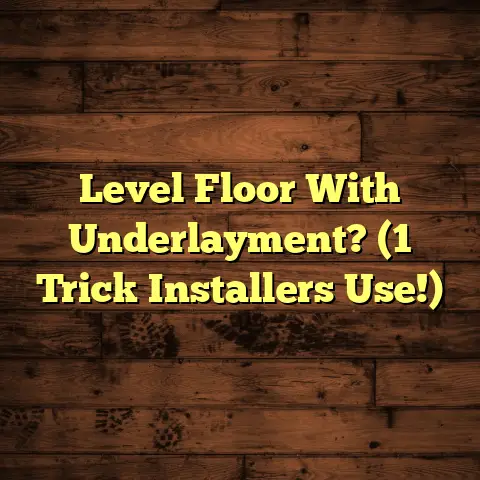Resin Flooring Cost In Pakistan (Explained)
Resin Flooring Cost in Pakistan (Explained)
Resin flooring is an increasingly popular choice for both residential and commercial spaces in Pakistan, known for its durability, aesthetic appeal, and ease of maintenance.
However, understanding the costs associated with installing resin flooring can be complex.
This article provides a comprehensive overview of the factors impacting the cost of resin flooring in Pakistan, including installation costs, material choices, and additional considerations.
Overview of Major Cost Factors
1. Area Size
The total area where resin flooring will be installed significantly influences the overall cost.
Generally, larger spaces benefit from economies of scale, whereas smaller areas may incur higher per-square-foot costs.
2. Type of Resin Flooring
Different types of resin flooring are available, each with varying costs. Common types include:
- Epoxy Resin Flooring: Known for its durability and chemical resistance, typically costs between PKR 1500 to PKR 3000 per square foot.
- Polyurethane Resin Flooring: Offers flexibility and a glossy finish, costing around PKR 2000 to PKR 3500 per square foot.
- Polyaspartic Flooring: A more advanced option with rapid curing times and excellent UV stability, usually priced higher at PKR 2500 to PKR 4000 per square foot.
3. Labor Costs
Labor costs can vary significantly depending on the contractor’s experience, location, and the complexity of the job.
On average, labor may add an additional PKR 500 to PKR 1500 per square foot to the installation cost.
4. Additional Considerations
Factors such as floor removal, subfloor preparation, and any necessary repairs or modifications also impact the total cost:
- Floor Removal: If existing flooring needs to be removed, expect an additional charge of PKR 100 to PKR 500 per square foot.
- Subfloor Replacement: If a new subfloor is required, costs can range from PKR 300 to PKR 800 per square foot.
- Material Grade: Higher-grade materials or those with unique finishes will naturally come at a premium.
Detailed Cost Breakdown
Cost Comparison: Hardwood vs Alternative Flooring Options
When considering flooring options, it’s important to compare costs:
While hardwood offers timeless beauty and durability, resin flooring presents a more budget-friendly option with similar benefits in many cases.
Signs That Hardwood Floors Need Replacement
Although this article focuses on resin flooring, it’s useful to understand when hardwood floors may need replacement.
Signs include:
- Severe Warping or Cupping: Indicates moisture damage.
- Deep Scratches or Gouges: If refinishing isn’t feasible.
- Persistent Odours: Suggests mould or mildew.
- Wear Patterns: Indicates that the finish has worn down significantly.
Refinish vs Replace
Deciding whether to refinish or replace hardwood floors depends on the extent of damage and the desired aesthetic.
Refinishing is often a cost-effective solution for minor wear but may not be suitable for severely damaged floors.
Pros and Cons of Resin Flooring
Pros
- Durability: Highly resistant to wear and chemicals.
- Low Maintenance: Easy to clean and maintain.
- Aesthetic Variety: Available in various colours and finishes.
- Quick Installation: Curing times are relatively fast.
Cons
- Initial Cost: Can be higher than some alternative options.
- Slippery Surface: May require anti-slip additives.
- Sensitivity to Temperature Changes: Expansion and contraction may occur in extreme conditions.
Professional Installation vs DIY
Cost Differences
- Professional Installation: Typically adds an additional PKR 500 to PKR 1500 per square foot for labor but ensures quality and proper technique.
- DIY Installation: Can save money but requires skills, tools, and time investment.
Tools Required
Common tools needed for DIY installation include:
- Trowels
- Mixing buckets
- Roller brushes
- Safety gear (gloves, masks)
Improper installation can lead to issues such as bubbling or peeling, which may result in costly repairs.
Questions to Ask Hardwood Flooring Contractors
When hiring a contractor for resin flooring installation, consider asking:
- What is your experience with resin flooring installations?
- Can you provide references or examples of past work?
- What type of warranty do you offer?
- How do you handle unexpected costs during installation?
- What preparation steps will you take before installation?
Care and Maintenance Tips for Resin Flooring
To maximise the longevity of resin flooring:
- Regular Cleaning: Use a soft broom or vacuum to remove dust and debris.
- Avoid Harsh Chemicals: Use pH-neutral cleaners to prevent damage.
- Prompt Spill Clean-Up: Wipe spills immediately to avoid staining.
- Furniture Pads: Use felt pads under furniture legs to prevent scratches.
- Periodic Inspections: Regularly check for any signs of wear or damage.
Conclusion
Resin flooring presents an attractive option for many homeowners and businesses in Pakistan due to its durability and aesthetic appeal.
By understanding the various cost factors involved, comparing it with alternative flooring options, and considering professional versus DIY installation, you can make an informed decision that best suits your needs and budget.
With proper care and maintenance, resin flooring can provide years of service while enhancing the beauty and functionality of your space.
Whether you’re building a new home or renovating an existing space, resin flooring offers an array of benefits worth considering.





